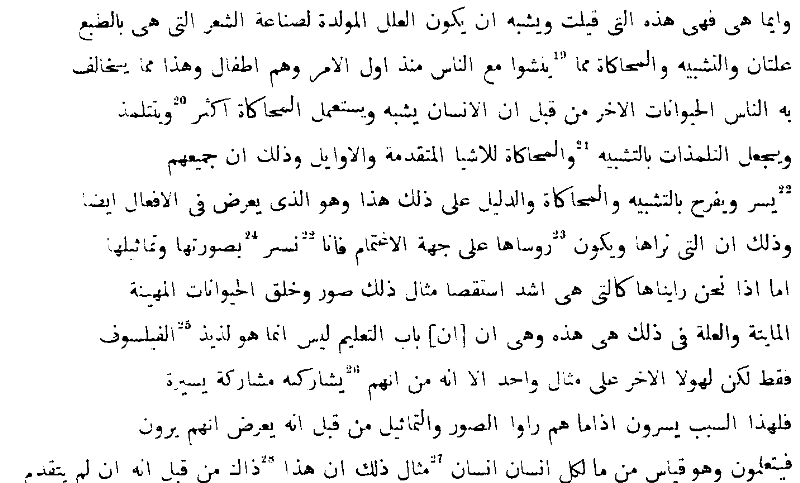Аристотель «Поэтика»: Естественное происхождение поэзии (1448b4)
Перевод М. Гаспарова
[b4] Породили поэтическое искусство явным образом две причины, и обе естественные. <А именно,> <1> подражать присуще людям с детства: [b5] <люди> тем ведь и отличаются от остальных живых существ, что склоннее всех к подражанию и даже первые познания приобретают путем подражания и результаты подражания всем доставляют удовольствие; [b8] доказательство этому — факты: на что нам неприятно смотреть <в действительности>, на то мы с удовольствием смотрим в самых точных изображениях — например, на облики гнуснейших животных и на трупы. [b12] Объясняется же это тем, что познавание — приятнейшее <дело> не только для философов, но равным образом и для прочих людей, только последние причастны ему в меньшей степени. Глядя на изображения, они радуются, потому что могут при таком созерцании поучаться и рассуждать, что есть что, например: «вот это —
Перевод В. Аппельрота
Так как подражание свойственно нам по природе, так же как и гармония и ритм (а что метры — особые виды ритмов, это очевидно), то еще в глубокой древности были люди, одаренные от природы способностью к этому, которые,
Перевод Н. Новосадского
Люди получают удовольствие, рассматривая картины, потому что, глядя на них, можно учиться и соображать, что представляет каждый рисунок, например, — «это такой то» (человек). А если раньше не случалось его видеть, то изображение доставит удовольствие не сходством, а отделкой, красками или
Так как нам свойственно по природе подражание, и гармония, и ритм, — а ясно, что метры части ритма, — то люди, одаренные с детства особенной склонностью к этому, создали поэзию, понемногу развивая ее из импровизаций.
Translated by W.H. Fyfe
Speaking generally, poetry seems to owe its origin to two particular causes, both natural. From childhood men have an instinct for representation, and in this respect, differs from the other animals that hs is far more imitative and learns his first lessons by representing things. And then there is the enjoyment people always get from representations. What happens in actual experience proves this, for we enjoy looking at accurate likenesses of things which are themselves painful to see, obscene beasts, for instance, and corpses. The reason is this: Learning things gives great pleasure not only to philosophers but also in the same way to all other men, though they share this pleasure only to a small degree. The reason why we enjoy seeing likenesses is that, as we look, we learn and infer what each is, for instance, «that is so and so». If we have never happened to see the original, our pleasure is not due to the representation as such but to the technique or the color or some other such cause.
[20] We have, then, a natural instinct for representation and for tune and rhythm — for the metres are obviously sections of rhythms — and starting with these instincts men very gradually developed them until they produced poetry out of their improvisations.
Translated by S.H. Butcher
Imitation, then, is one instinct of our nature. Next, there is the instinct for ‘harmony’ and rhythm, meters being manifestly sections of rhythm. Persons, therefore, starting with this natural gift developed by degrees their special aptitudes, till their rude improvisations gave birth to Poetry.
Translated by I. Bywater
It is clear that the general origin of poetry was due to two causes, each of them part of human nature. Imitation is natural to man from childhood, one of his advantages over the lower animals being this, that he is the most imitative creature in the world, and learns at first by imitation. And it is also natural for all to delight in works of imitation. The truth of this second point is shown by experience: though the objects themselves may be painful to see, we delight to view the most realistic representations of them in art, the forms for example of the lowest animals and of dead bodies. The explanation is to be found in a further fact: to be learning something is the greatest of pleasures not only to the philosopher but also to the rest of mankind, however small their capacity for it; the reason of the delight in seeing the picture is that one is at the same time learning — gathering the meaning of things, e.g. that the man there is
Traduction Ch. Emile Ruelle
II. Le fait d’imiter est inhérent à la nature humaine dès l’enfance; et ce qui fait différer l’homme d’avec les autres animaux, c’est qu’il en est le plus enclin à l’imitation : les premières connaissances qu’il acquiert, il les doit à l’imitation , et tout le monde goûte les imitations.
III. La preuve en est dans ce qui arrive à propos des oeuvres artistiques; car les mêmes choses que nous voyons avec peine, nous nous plaisons à en contempler l’exacte représentation, telles, par exemple, que les formes des bêtes les plus viles et celles des cadavres.
IV. Cela tient à ce que le fait d’apprendre est tout ce qu’il y a de plus agréable non seulement pour les philosophes, mais encore tout autant pour les autres hommes; seulement
V. Et en effet, si l’on se plaît à voir des représentations d’objets, c’est qu’il arrive que cette contemplation nous instruit et nous fait raisonner sur la nature de chaque chose, comme, par exemple, que tel homme est un tel; d’autant plus que si, par aventure, on n’a pas prévu ce qui va survenir, ce ne sera pas la représentation qui produira le plaisir goûté, mais plutôt l’artifice ou la couleur, ou quelque autre considération.
VI. Comme le fait d’imiter, ainsi que l’harmonie et le rythme, sont dans notre nature (je ne parle pas des mètres qui sont, évidemment, des parties des rythmes), dès le principe, les hommes qui avaient le plus d’aptitude naturelle pour ces choses ont, par une lente progression, donné naissance à la poésie, en commençant par des improvisations.

